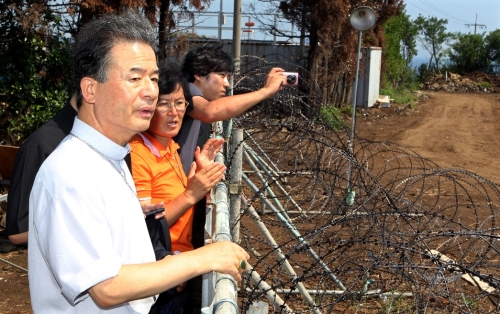With construction under way and opposition not letting up ...
Should Jeju have a naval base?
Battleground of ideas
The proposed naval base at Gangjeong on Jeju Island has been a source of bitter controversy since it was first announced in 2007. The South Korean Navy argues that the $970 million dollar construction, which is to include a port with capacity for 20 warships and two cruise liners, is necessary to protect the country’s shipping lines and respond to future territorial disputes with China. Opposition to the base, comprised of local residents, civic groups, left-leaning politicians and trade unions, has centered on environmental concerns, fears of destabilizing Korea-China relations and perceived American imperialism. (The U.S. and Korea both deny any American involvement in the plan, although U.S. navy ships will be permitted to dock at the base.) The dispute has also grabbed international attention, with high profile figures such as U.S. foreign policy critic Noam Chomsky and American feminist Gloria Steinman voicing their opposition to the base.
Although a court last month ruled that the Navy could continue construction of the base as planned, the conflict has shown few signs of dying down. Tense standoffs between police and protesters have continued, resulting in arrests and claims of police heavy-handedness. Just earlier this month, police arrested 11 university students for breaking into a fenced-off construction site. The students later claimed they had suffered violence at the hands of Navy personnel at the scene.
Should Jeju have a naval base?
Battleground of ideas
The proposed naval base at Gangjeong on Jeju Island has been a source of bitter controversy since it was first announced in 2007. The South Korean Navy argues that the $970 million dollar construction, which is to include a port with capacity for 20 warships and two cruise liners, is necessary to protect the country’s shipping lines and respond to future territorial disputes with China. Opposition to the base, comprised of local residents, civic groups, left-leaning politicians and trade unions, has centered on environmental concerns, fears of destabilizing Korea-China relations and perceived American imperialism. (The U.S. and Korea both deny any American involvement in the plan, although U.S. navy ships will be permitted to dock at the base.) The dispute has also grabbed international attention, with high profile figures such as U.S. foreign policy critic Noam Chomsky and American feminist Gloria Steinman voicing their opposition to the base.
Although a court last month ruled that the Navy could continue construction of the base as planned, the conflict has shown few signs of dying down. Tense standoffs between police and protesters have continued, resulting in arrests and claims of police heavy-handedness. Just earlier this month, police arrested 11 university students for breaking into a fenced-off construction site. The students later claimed they had suffered violence at the hands of Navy personnel at the scene.

It is in our national interest
Koreans are well-known for their unity. The way they can unite is remarkable to the world, as displayed by their gold donations to save the country from bankruptcy during the Asian financial crisis in 1997 and their cheering for the national soccer team during the World Cup, both highly publicized in international media. But when it comes to the national security agenda, let alone interests, unity is nowhere to be seen. Politicians often fail to demonstrate bipartisanship.
Interest groups and NGOs are very much dictated by their ideals and ideology. Experts and scholars are often divided by their political inclination and orientation. As recently as last year, Koreans failed to evince any kind of unity in condemning North Korea as the culprit of the Cheonan vessel sinking, killing 46 sailors who were only guilty of defending the country and our lives and mocked the credibility of the government’s investigation results.
Division among Koreans over national security is on display again. It is over the naval base being built on Jeju Island. This is a long-sought project, dating back to the early 1990s. It was a done deal in 2007. It was a decision made by former president Roh Moo-hyun, alas, a figure highly recognized and followed by the majority of those opposing the base. It is in the midst of construction. Delays will cost taxpayers money, including those in the protest camp. Presumably, the project has received full scrutiny, ranging from environmental and local economic effects to political reasoning. The conclusion on the need for the base is simple: It is required to better defend our national security and interests in the long run. And it may be only the beginning. Korea, even after unification, will have to continue building its naval force to better defend its waters, which will otherwise remain vulnerable to underlying uncertainties arising from the aspirations of neighboring naval powerhouses.
Already Korea is very vulnerable when it comes to defending its maritime interests. The vulnerability is underscored by illegal fishing by Chinese fishermen, for example. Their intrusions inflict not only unnecessary damage on our marine resources but also human casualties among our coast guards. It is not a story of yesterday. For instance, from 1988 to July of 1992, 2,160 intrusions were recorded. From 2006 to 2010, the Korean coastguard seized 2,161 Chinese fishing boats. Despite our government’s complaints, the Chinese authorities don’t seem to hear us. Why so? They can’t control every single fishing boat. The responsibility lies on our shoulders, as it happens in our jurisdiction and becomes an internal affair of ours.
Regardless, Jeju naval base is not all about China. It is about our national security, defense, and interests. More than 90 percent of the oil and gas we consume comes from overseas. Our livelihood depends on foreign trade. Open waters are integral to our nation’s survival. Korea needs to better protect its sea lanes. Fortunately, to date, they have been well protected under the commandership of the U.S. Asia-Pacific navy force. Now it is time to be independent and autonomous with our defense, and in defending our own security and interests. Isn’t this what the opposition to the base wants ― to be independent of the U.S.? America can’t defend our territorial sovereignty. There is only so much America can do in defending our maritime interests, especially those in conflict with neighboring states.
The naval base on Jeju Island will serve our own nation’s security and our own nation’s interests. It is not a base to serve anybody else’s including those of the U.S., but ours. It will not provoke China. It is not going to ignite an arms race in Northeast Asia. It is way too small to do that, I must admit. It will be, however, big enough to handle our own security matters, protecting our sea lanes and safeguarding maritime interests in our own waters. The time has arrived for Korea to stand up against the aspirations to expand the maritime boundaries of neighboring states. If this is not convincing, we might as well talk to those who have had experiences in dealing with similar situations with similar actors in South China Sea. That is, the Southeast Asian states. They might tell us, “You are on your own and no one is going to defend your interests in lieu of you.”

By Choo Jae-woo
Choo Jae-woo is a professor at Kyung Hee University and visiting professor at Georgia Institute of Technology. ― Ed.
We are creating a strategic burden
I have often visited Gangjeong, which is suffering due to the Jeju naval base construction. It is so obvious how unreasonable it is to construct the naval base in this place, where Gurumbee rocks span on abundant and fertile farmland with first-class water running along Gangjeong stream and with various endangered animal species. It is so clear in Gangjeong village how the construction tore up the village community, which was once beautiful and peaceful, and how the villagers are protesting against the construction at the risk of their lives. It is certain in this village that the remarks from the conservatives like “Kim Jung-il’s puppet” and “advocates for North Korea” are groundless.
However, the South Korean government and the navy are still obstinate. Encompassing the village with hundreds of policemen and fences, they forcefully restarted the construction. They are trying to weaken the anti-base construction movement by arresting villagers and activists and abusing governmental authority. By stigmatizing the opposition group as rebellious people, they are attempting to isolate Gangjeong from South Korea.
One might think the opposition should acquiesce for the sake of the national interest. However, it is concluded that, for the very national interest, the base construction must be stopped because the base would ruin not only the beautiful and peaceful natural community but also relations between South Korea and China.
One reason the government and the navy mention to justify the naval base construction, is the protection of Ieodo which is also called Socotra Rock located between the southern sea of Jeju Island and the East China Sea. It is said that the naval base will be helpful to protect Ieodo from the threat of China. It is, however, a dangerous and foolish idea that makes an “uncertain threat” into a “certain threat.” If a warship is sent first from South Korea to the sea, which is disputed by the two countries, it will cause a confrontation with the Chinese navy which could lead to diplomatic, security, and economic losses. Considering China as our biggest trade partner and that an amicable relationship with China as important, it is doubtful whether the argument of the navy and the government is really in the national interest.
The dispute over Ieodo should be settled by dialogue rather than military action in order to make an agreement over an exclusive economic zone (EEZ). If China consents to include Ieodo into a South Korean EEZ with the condition of permitting South Korea-China or South Korea-China-Japan to examine and develop oil or seabed resources together, this compromise can be worth considering. It is also important to realize that none of countries can acquire seabed resources near Ieodo unless both countries make an agreement on EEZ.
Moreover, the Jeju naval base is likely to be used as a port of call and, in a contingency, as a stopover or takeoff base by the U.S. navy. Based on the mutual defense pact and Status of Forces Agreement, the U.S. has the right in principle to use any South Korean ports and airfields. Given the geographical features of Jeju Island and the fact that the United States is increasing its naval power, including Aegis Ballistic Missile Defense and seeking more naval bases and port calls in Asia-Pacific, these concerns are quite reasonable.
Should the Jeju base be used by the U.S. military for the purpose of blockading China, China will retaliate in various ways including diplomatic complaints and economic retaliation such as restrictions in travel and trade. In the worst case, China’s reaction could include military action such as retaliatory attacks and a maritime transportation blockade. On the other hand, if South Korea rejects the U.S. call to use Jeju, the ROK-US alliance would be in peril. That’s why the Jeju naval base will turn out to be a strategic burden, not and asset. We don’t need to worry about this kind of dilemma if South Korea cancels the base construction. The Jeju naval base construction must not be enforced but be stopped, in the national interest.

By Cheong Wook-sik
Cheong Wook-sik is a representative of Peace Network. ― Ed.









![[Kim Seong-kon] Democracy and the future of South Korea](http://res.heraldm.com/phpwas/restmb_idxmake.php?idx=644&simg=/content/image/2024/04/16/20240416050802_0.jpg&u=)







![[KH Explains] Hyundai's full hybrid edge to pay off amid slow transition to pure EVs](http://res.heraldm.com/phpwas/restmb_idxmake.php?idx=652&simg=/content/image/2024/04/18/20240418050645_0.jpg&u=20240418181020)

![[Today’s K-pop] Zico drops snippet of collaboration with Jennie](http://res.heraldm.com/phpwas/restmb_idxmake.php?idx=642&simg=/content/image/2024/04/18/20240418050702_0.jpg&u=)